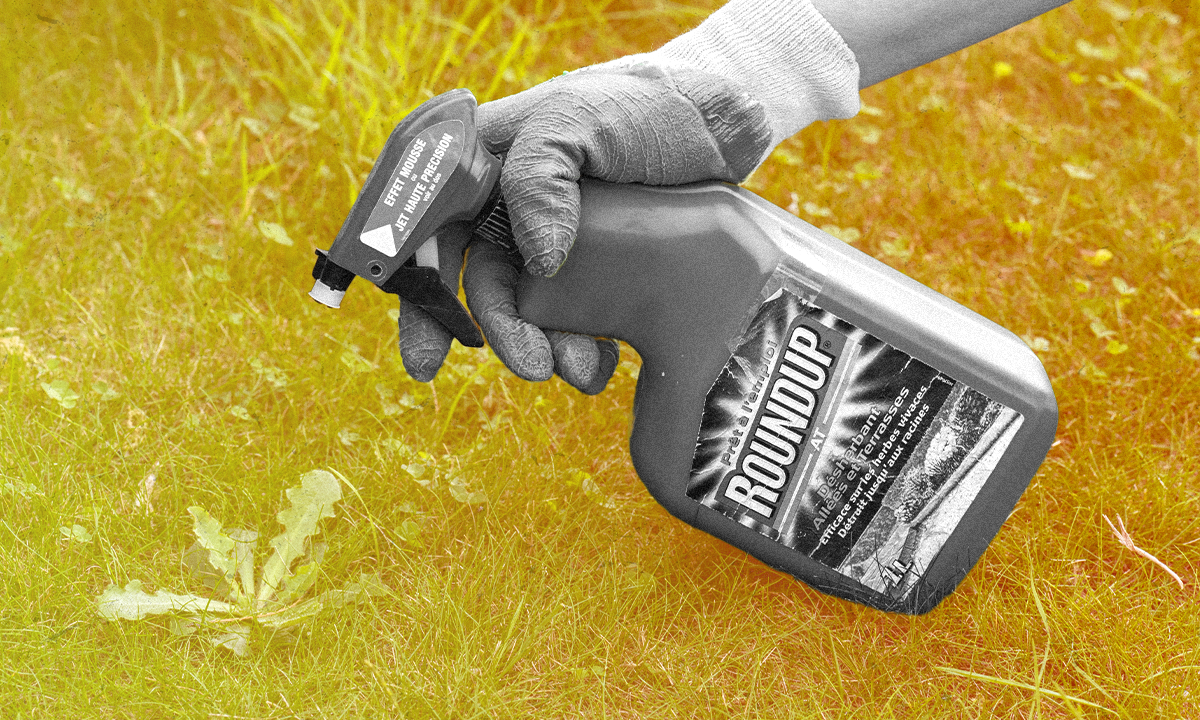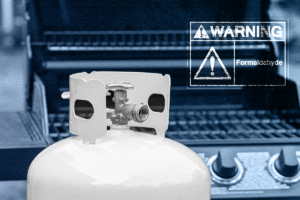Study: Roundup Has Ramped Up the Danger
After promising to remove glyphosate from its popular herbicide, Bayer has instead made its lawn products vastly more toxic. (Graphic by Truthdig)
(Graphic by Truthdig)
Roundup isn’t just bad; it’s getting worse. A new report from Friends of the Earth (FOTE) claims that the world’s most widely used commercial pesticide has become 45 times more dangerous to people and the environment. The findings come after years of litigation that had presumably forced Bayer to remove the product’s toxic main ingredient, glyphosate, in an attempt to make it less deadly.
When Bayer bought Monsanto in 2018, the company was facing thousands of lawsuits over the detrimental effects of Roundup, its flagship weed killer. Soon after the $63-billion sale, a California jury found Bayer responsible for groundskeeper Dewayne Johnson’s blood cancer, specifically non-Hodgkin lymphoma, which had been linked to the chemicals in Roundup. In 2021, after cancer victims had filed more than 100,000 lawsuits against Bayer, the company finally caved, announcing that it would remove glyphosate from Roundup beginning in 2023.
That didn’t happen. According to FOTE, a Washington, D.C.-based environmental advocacy nonprofit organization, seven products in the Roundup line that can be found on shelves at your local hardware store still contain glyphosate. The chemical has been linked to cancer, low-birth weight, preterm delivery and damage to “the structure and function of the nervous system of humans, rodents, fish and invertebrates.”
What’s more, Bayer’s updated versions of some products contain replacement chemicals that pose even greater risks than glyphosate. Worst among them is diquat dibromide, an herbicide that FOTE’s analysis found to be “200 times more toxic than glyphosate in terms of long-term, chronic exposure and is classified as a highly hazardous pesticide.”
Bayer’s updated versions of some Roundup products contain replacement chemicals that pose even greater risks than glyphosate.
The jury in Johnson’s trial found that the company had “acted with malice” for failing to warn the groundskeeper of Roundup’s dangers. This, according to FOTE, was part of a campaign of disinformation that Bayer — and before that Monsanto — waged to obscure the risks, much like Big Oil and Big Tobacco have done with their own deleterious products. According to FOTE, the effort has made Roundup into “by far the highest-selling and most profitable pesticide ever discovered.”
Because certain genetically modified crops have been bred to withstand heavy doses of glyphosate, the herbicide and GM crops form a toxic partnership — one that has proven devastating to domestic agriculture, public health, the environment and food sovereignty the world over. In Mexico, the threats posed by glyphosate and GM corn spurred then-president Andrés Manuel López Obrador to ban the pair in 2023.
“Mexico provided mountains of evidence from peer-reviewed literature that showed ample cause for concern about the risks of consuming GM corn and the residues of the herbicide glyphosate — most commonly known as Roundup — that often come with it,” Timothy Wise wrote for Truthdig.
In the United States, the FOTE’s new study notes, half the herbicides sold by Home Depot and Lowes in 2021 contained highly hazardous chemicals. This, the authors argue, “is indicative of the ongoing failure of the EPA to adequately protect consumers and the environment from these chemicals.”
In lieu of action from the top, they’re calling on retailers to pull the most dangerous products from their shelves, or at least ensure labels accurately convey the risk.
Your support is crucial...As we navigate an uncertain 2025, with a new administration questioning press freedoms, the risks are clear: our ability to report freely is under threat.
Your tax-deductible donation enables us to dig deeper, delivering fearless investigative reporting and analysis that exposes the reality beneath the headlines — without compromise.
Now is the time to take action. Stand with our courageous journalists. Donate today to protect a free press, uphold democracy and uncover the stories that need to be told.






You need to be a supporter to comment.
There are currently no responses to this article.
Be the first to respond.